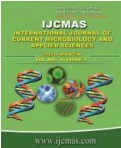


 National Academy of Agricultural Sciences (NAAS)
National Academy of Agricultural Sciences (NAAS)

|
PRINT ISSN : 2319-7692
Online ISSN : 2319-7706 Issues : 12 per year Publisher : Excellent Publishers Email : editorijcmas@gmail.com / submit@ijcmas.com Editor-in-chief: Dr.M.Prakash Index Copernicus ICV 2018: 95.39 NAAS RATING 2020: 5.38 |
Bacteria grow very rapidly under warmth and moisture. Many plant extracts from roots, stem, leaves, flowers, fruits and seeds of diverse species of plants exhibit anti-bacterial properties. These can be used for treating the textiles and the relatively lower incidence of the adverse reaction of these treatments coupled with reduced cost can be exploited as an effective eco-friendly alternative to the synthetic antimicrobial agents for textile applications. Utilization of karanja leaves which are available in abundance and underutilized may be found effective for treatment of resistance against micro-orgasms on cotton fabric. Karanja extract have been used to impart the bacterial resistant property on cotton fabric. Karanja methanolic extract from leaves in viscous and dry state were prepared by soxhlet method and impregnated in 2.5g/l concentration. The antiseptic containing chloroxylenol treatment was taken as standard. The effect of all karanja extract treatments and antiseptic containing chloroxylenol (standard) treatment, were tested for Pseudomonas bacteria resistance activity, quantitatively by AATCC-100 test method. Bacteria count of treated samples again tested and determined percent reduction. It was concluded that leaves extracts in viscous state were more effective than other treatments and it was found hundred percent reductions effective after 30 minutes of inoculation of Pseudomonas bacteria. However, it is leaves extracts in viscous state showed comparable results with the antiseptic containing chloroxylenol (standard). In some cases leaves extracts in viscous state was even more effective than antiseptic treatment.
 |
 |
 |
 |
 |